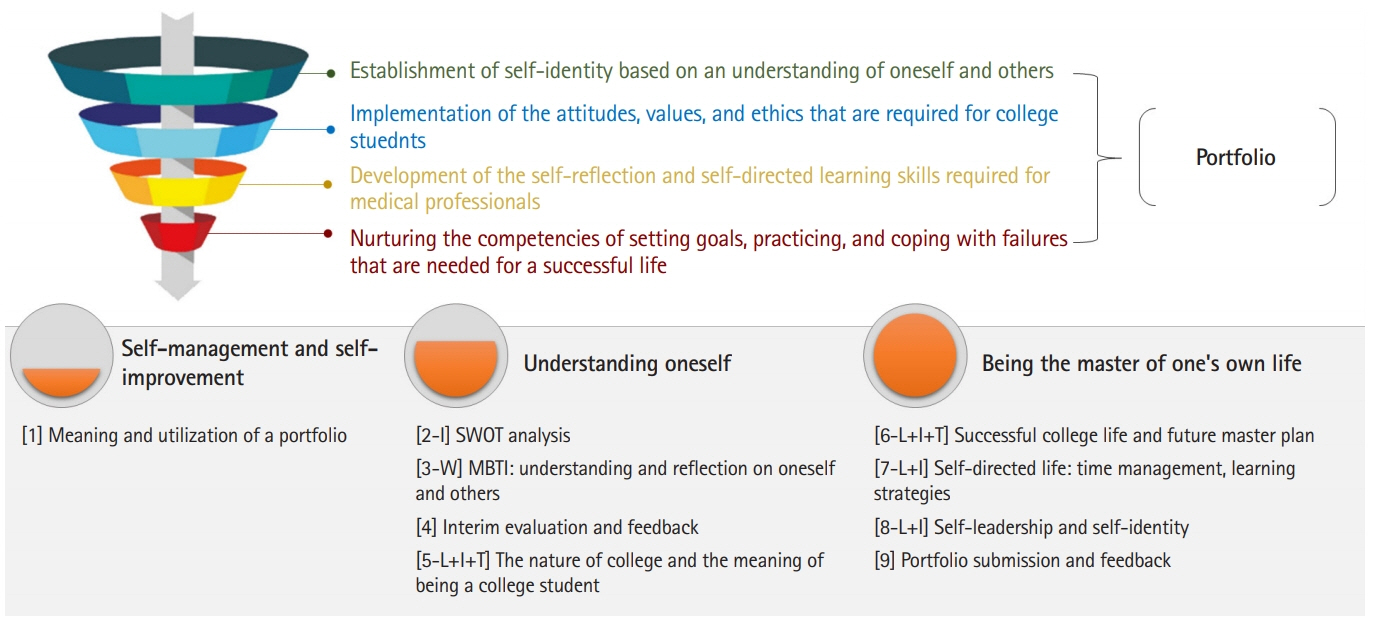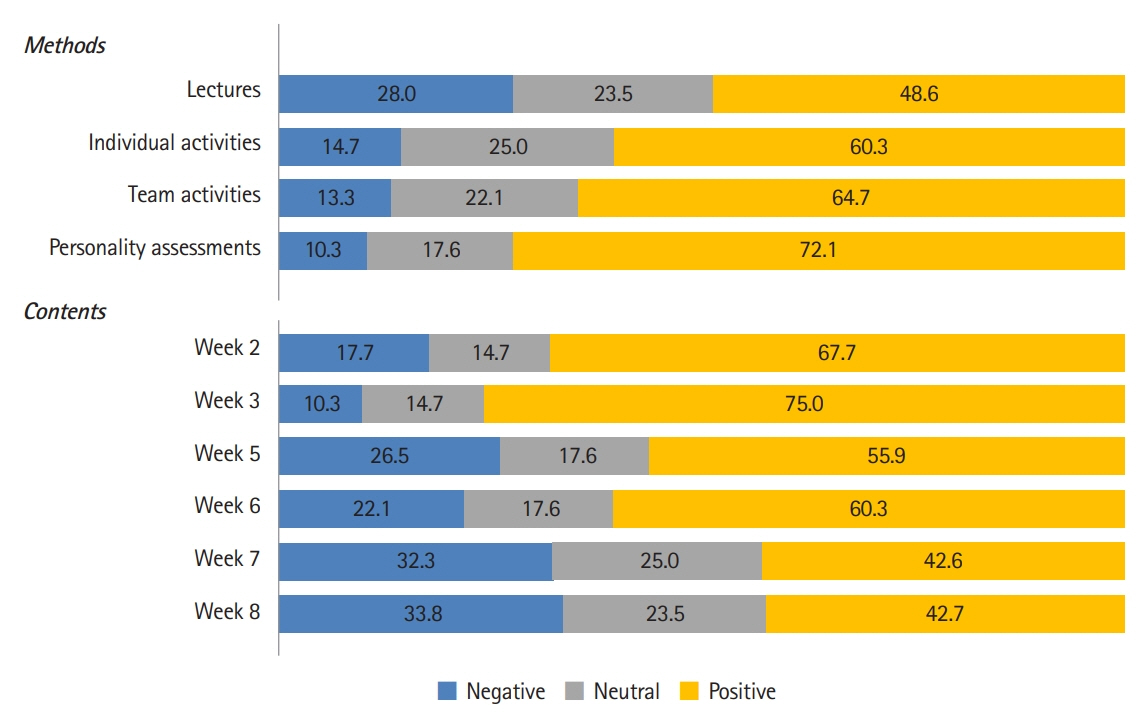J Educ Eval Health Prof.
2019;16:38. 10.3352/jeehp.2019.16.38.
Evaluation of a portfolio-based course on self-development for pre-medical students in Korea
- Affiliations
-
- 1Department of Medical Education, College of Medicine, The Catholic University of Korea, Seoul, Korea
- KMID: 2502161
- DOI: http://doi.org/10.3352/jeehp.2019.16.38
Abstract
- Purpose
We have developed and operated a portfolio-based course aimed at strengthening pre-medical students’ capabilities for self-management and self-improvement. In order to determine the effectiveness of the course and to establish future operational strategies, we evaluated the course and the students’ learning experience.
Methods
The subjects of this study were 97 students of a pre-medical course “Self-development and portfolio I” in 2019. Their learning experience was evaluated through the professor’s assessment of portfolios they had submitted, and the program was evaluated based on the responses of 68 students who completed a survey. The survey questionnaire included 32 items. Descriptive statistics were reported for quantitative data, including the mean and standard deviation. Opinions collected from the open-ended question were grouped into categories.
Results
The evaluation of students’ portfolios showed that only 6.2% of the students’ portfolios were well-organized, with specific goals, strategies, processes, and self-reflections, while most lacked the basic components of a portfolio (46.4%) or contained insufficient content (47.4%). Students’ responses to the survey showed that regular portfolio personality assessments (72.1%), team (64.7%), and individual (60.3%) activities were felt to be more appropriate as educational methods for this course, rather than lectures. Turning to the portfolio creation experience, the forms and components of the portfolios (68.2%) and the materials provided (62.2%) were felt to be appropriate. However, students felt that individual autonomy needed to be reflected more (66.7%) and that this course interfered with other studies (42.5%).
Conclusion
The findings of this study suggest that standardized samples, guidelines, and sufficient time for autonomous portfolio creation should be provided. In addition, education on portfolio utilization should be conducted in small groups in the future.
Keyword
Figure
Cited by 1 articles
-
Development and validation of a portfolio assessment system for medical schools in Korea
Dong Mi Yoo, A Ra Cho, Sun Kim, Sun Huh
J Educ Eval Health Prof. 2020;17:39. doi: 10.3352/jeehp.2020.17.39.
Reference
-
References
1. Kim CJ, Kwon I, Han HJ, Heo YJ, Ahn D. Korean doctors’ perception on doctor's social competency: based on a survey on doctors. J Korean Med Assoc. 2014; 57:128–136. http://doi.org/10.5124/jkma.2014.57.2.128.
Article2. Dent JA, Harden RM. A practical guide for medical teachers. 4th ed. London: Churchill Livingstone;2013.3. Friedman Ben David M, Davis MH, Harden RM, Howie PW, Ker J, Pippard MJ. AMEE Medical Education Guide no. 24: portfolios as a method of student assessment. Med Teach. 2001; 23:535–551. https://doi.org/10.1080/01421590120090952.
Article4. Kim KJ. e-Portfolios for learning and assessment in medical education. Korean Med Educ Rev. 2014; 16:7–10. https://doi.org/10.17496/kmer.2014.16.1.007.
Article5. Vance GH, Burford B, Shapiro E, Price R. Longitudinal evaluation of a pilot e-portfolio-based supervision programme for final year medical students: views of students, supervisors and new graduates. BMC Med Educ. 2017; 17:141. https://doi.org/10.1186/s12909-017-0981-5.
Article6. Buckley S, Coleman J, Davison I, Khan KS, Zamora J, Malick S, Morley D, Pollard D, Ashcroft T, Popovic C, Sayers J. The educational effects of portfolios on undergraduate student learning: a Best Evidence Medical Education (BEME) systematic review: BEME Guide no. 11. Med Teach. 2009; 31:282–298. https://doi.org/10.1080/01421590902889897.
Article7. Fida NM, Hassanien M, Shamim MS, Alafari R, Zaini R, Mufti S, Al-Hayani A, Farouq M, Al-Zahrani H. Students' perception of portfolio as a learning tool at King Abdulaziz University Medical School. Med Teach. 2018; 40(sup1):S104–S113. https://doi.org/10.1080/0142159X.2018.1466054.
Article8. Sanchez Gomez S, Ostos EM, Solano JM, Salado TF. An electronic portfolio for quantitative assessment of surgical skills in undergraduate medical education. BMC Med Educ. 2013; 13:65. https://doi.org/10.1186/1472-6920-13-65.
Article9. Belcher R, Jones A, Smith LJ, Vincent T, Naidu SB, Montgomery J, Haq I, Gill D. Qualitative study of the impact of an authentic electronic portfolio in undergraduate medical education. BMC Med Educ. 2014; 14:265. https://doi.org/10.1186/s12909-014-0265-2.
Article10. Haffling AC, Beckman A, Pahlmblad A, Edgren G. Students’ reflections in a portfolio pilot: highlighting professional issues. Med Teach. 2010; 32:e532–e540. https://doi.org/10.3109/0142159X.2010.509420.
Article
- Full Text Links
- Actions
-
Cited
- CITED
-
- Close
- Share
- Similar articles
-
- Development of a portfolio for competency-based assessment in a clinical clerkship curriculum
- Design and Implementation of a Web-based Portfolio Assessment System for a Family Medicine Residency Program in Korea
- Effect of portfolio assessment on student learning in prenatal training for midwives
- Development and validation of a portfolio assessment system for medical schools in Korea
- How to enhance students’ learning in a patient-centered longitudinal integrated clerkship: factors associated with students’ learning experiences





